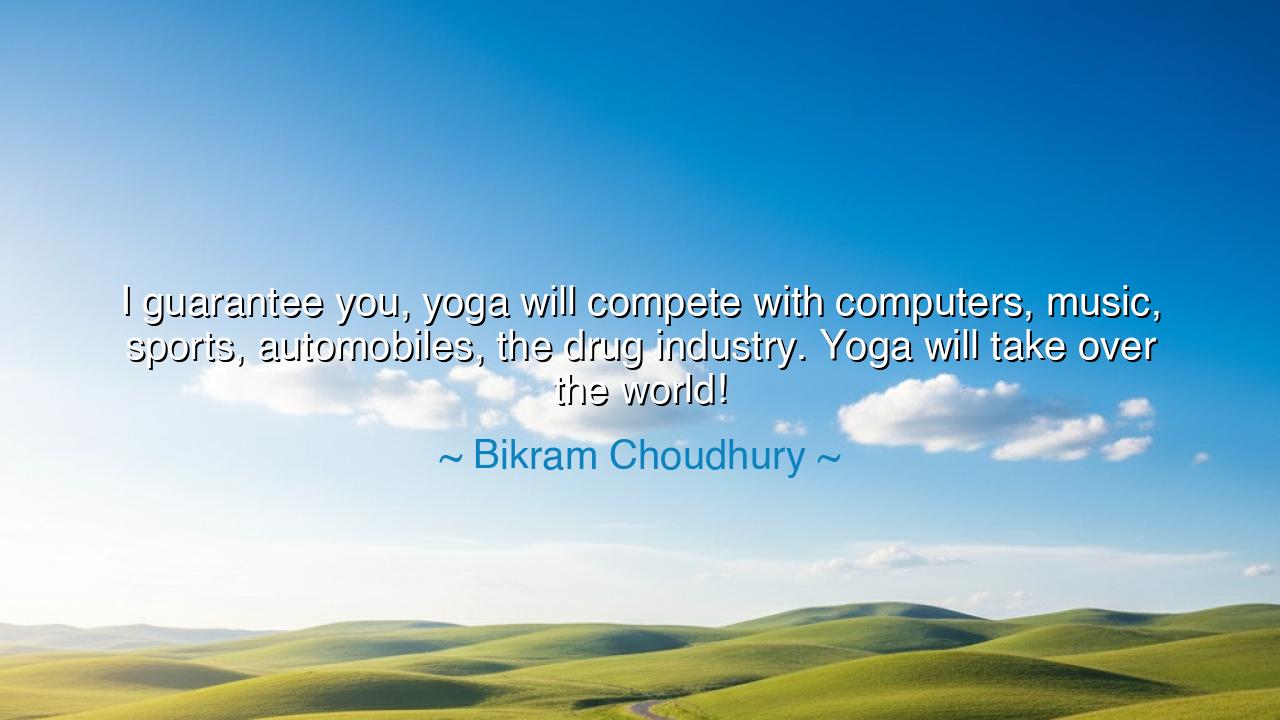
I guarantee you, yoga will compete with computers, music, sports
I guarantee you, yoga will compete with computers, music, sports, automobiles, the drug industry. Yoga will take over the world!






When Bikram Choudhury declared, “I guarantee you, yoga will compete with computers, music, sports, automobiles, the drug industry. Yoga will take over the world!” he spoke not merely of poses or physical exercise, but of a spiritual uprising—a return to the ancient art of self-mastery. His prophecy was not about domination, but transformation. In a world obsessed with speed, power, and consumption, yoga offers a silent rebellion: it slows time, balances the mind, and restores the forgotten harmony between body and soul. To say that yoga would compete with the engines of modernity was to say that the spirit would once again rise to challenge the machines of progress.
In the old days, when sages sat in quiet meditation beneath banyan trees, they too were revolutionaries. They sought mastery not over land or nations, but over the inner storms of the self. What computers now do for the intellect—organizing, analyzing, connecting—yoga does for the inner life. It clears the clutter, harmonizes the senses, and connects the self to the eternal. What music does for emotion—stirring rhythm and resonance—yoga does for the heart, tuning its vibrations to the divine frequency of calm. And where sports strengthen muscle and competition, yoga strengthens discipline and compassion.
Bikram’s claim that yoga would rival even the automobile and the drug industry is not vanity—it is vision. The car moves the body, but yoga moves the spirit. The drug soothes the symptom, but yoga heals the root. In this sense, his words were prophetic: in an age of noise, yoga offers silence; in an age of excess, it offers simplicity; in an age of disconnection, it offers union. The Sanskrit word yuj, from which “yoga” is born, means “to yoke,” “to unite.” And in this unity lies the medicine for a world fractured by speed and distraction.
Consider the story of Paramahansa Yogananda, who brought yoga from India to the West in the early 20th century. When he arrived in America, few understood meditation or pranayama. Yet through patience and faith, his teachings spread across continents, drawing millions to the idea that peace could be cultivated from within. Yogananda’s Autobiography of a Yogi became a beacon for seekers—from Gandhi to Steve Jobs—proof that this ancient discipline could awaken even the most modern of souls. His journey was not just the spread of a practice, but the quiet invasion of spiritual balance into the empire of material progress.
To say that yoga will “take over the world” is to say that humanity will one day rediscover its center. When technology, fame, and medicine fail to heal the ache within, people will turn to the breath, to stillness, to the wisdom of the body that never lies. It will not be a conquest through violence or commerce, but a peaceful revolution of awareness. Yoga will not overthrow industries—it will awaken individuals. And when enough individuals awaken, the world itself will transform.
But this vision demands discipline. Yoga is not a trend to be consumed, nor a posture for vanity. It is a lifelong pilgrimage inward. In the style of the ancients, the true yogi is not the one who bends the body, but the one who bends the ego. In each asana lies a lesson of surrender; in each breath, a reminder of impermanence. Those who embrace it with humility find not escape, but awakening—a clarity that neither machine nor medicine can replicate.
Thus, Bikram Choudhury’s words should be heard as both a prophecy and a challenge. The modern world has built towers of steel but lost touch with the soil of the soul. To reclaim peace, we must return to what is timeless—to the discipline of stillness, to the courage of silence, to the grace of breath. The revolution he foresaw is already here, not in temples or studios, but in every heart that chooses awareness over addiction, balance over chaos, truth over distraction.
Final Lesson: True progress is not measured by speed or wealth, but by harmony between body, mind, and spirit. The future belongs not to the restless, but to the centered.
Practical Actions: Begin each day with a moment of stillness. Learn to breathe deeply before reacting. Let your mind rest where your body stands. Practice yoga not to perfect the pose, but to perfect your peace. For when you master yourself, you no longer compete with the world—you help it awaken.






AAdministratorAdministrator
Welcome, honored guests. Please leave a comment, we will respond soon